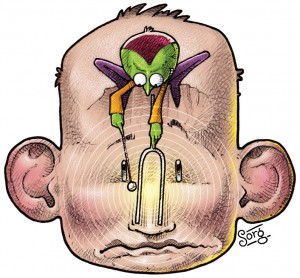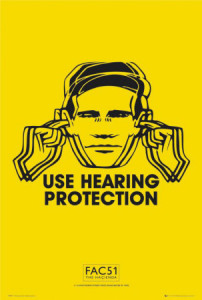What is Tinnitus?
Tinnitus (pronounced “TIN-i-tis” or “ti-NITE-us”) is the perception of sound within the ear in the absence of a corresponding external sound. The sound of tinnitus can take many forms and is often described as a “buzzing,” “ringing,” “humming,” “whooshing,” or like “crickets,” “cicadas,” or “static.” There is even a rare form called “musical tinnitus” where the individual describes tones or weak melody.
external sound. The sound of tinnitus can take many forms and is often described as a “buzzing,” “ringing,” “humming,” “whooshing,” or like “crickets,” “cicadas,” or “static.” There is even a rare form called “musical tinnitus” where the individual describes tones or weak melody.
Tinnitus affects 1 in 5 people (50 million Americans) and symptoms vary greatly among individuals in relation to loudness, pitch, quality (“buzz” vs “ring”), and how often it occurs (intermittent or constant). Although many people gradually adjust to their tinnitus, the effects of tinnitus can be quite debilitating for others, leading to poor sleep, anxiety, and feelings of distress.
The word “tinnitus” is Latin in origin and means “to ring or tinkle like a bell.”
Strange But True Trivia: There are some forms of tinnitus which can actually be heard by another person (or recorded) coming from the ear of the individual with tinnitus, which is referred to as “objective tinnitus.” Most forms are classified as “subjective tinnitus” where it is only heard internally by the person who has it.
What Causes Tinnitus?
 The classical view of tinnitus is that it is an “ear” phenomenon related to damage or disorder of the auditory system, but neurophysiological (nerve, brain, and one’s cognitive perception) models have gained more credibility through recent research. While there is continued debate on the subject, my inclination is that both tinnitus models exist on a continuum where ear causes are at one end of a spectrum and neurophysiological causes are at the other end, with many individuals falling in-between with some combination of the two. Although researchers and scientists continue to work on understanding the underlying mechanisms which result in tinnitus, several sources and triggers have been identified which may provoke or contribute to this problem.
The classical view of tinnitus is that it is an “ear” phenomenon related to damage or disorder of the auditory system, but neurophysiological (nerve, brain, and one’s cognitive perception) models have gained more credibility through recent research. While there is continued debate on the subject, my inclination is that both tinnitus models exist on a continuum where ear causes are at one end of a spectrum and neurophysiological causes are at the other end, with many individuals falling in-between with some combination of the two. Although researchers and scientists continue to work on understanding the underlying mechanisms which result in tinnitus, several sources and triggers have been identified which may provoke or contribute to this problem.
1. Noise exposure–the structures of the inner ear (sensory haircells for example) are very sensitive and can be damaged by very loud sounds or long exposures to sounds unprotected. Many people have experienced temporary ringing in the ears following a loud concert or other similar event. While the ears seem to recover, some damage can remain only to show up years later. It makes sense that tinnitus can be an early sign of hearing damage and that it is much more likely to accompany hearing loss.
2. Ototoxicity–or toxins which reach the auditory system. This can be the result of medications, drugs, or chemicals. Ototoxins can cause temporary or permanent damage to the auditory system, resulting in hearing loss and/or tinnitus. Some medications are also vestibulotoxic, effecting the components of the ear related to balance. Many medications list tinnitus as a possible side-effect and can be dose- or interaction-dependent. Aspirin in larger doses and alcohol can increase tinnitus temporarily.
3. Cerumen (Earwax)–impacted cerumen in the ear canals or against the eardrum can make tinnitus worse. Often, once the wax is carefully removed by your audiologist’s or physician’s office, the level of noise may be reduced
4. Jaw Misalignment/TMJ–because the jaw socket is so close to auditory structures, problems and pressure (even clenching) from the jaw can cause tinnitus.
5. Sinus and Ear Infections–infections and inflammation of or around the ears (including the eardrum and eustachian tube) may also cause or increase tinnitus.
6. Lifestyle–stress, fatigue, poor diet (high salt or sugar), and poor sleep along with alcohol, caffeine, and nicotine use have all been associated with increased levels of tinnitus. Increased anxiety and depression are also thought to have a negative influence on tinnitus levels.
7. Genetics–as with hearing loss, some individuals have a higher predisposition for developing ear problems, including tinnitus. While you may not be able to change your genes, if you have a known family history of tinnitus and/or hearing loss, then you should already be taking measures to protect your ears (such as wearing earplugs around noise).
8. Underlying/Associated Conditions–additionally, some forms of tinnitus can be a sign of another (more serious) underlying problem, such as cardio-vascular disorder or a tumor in rare cases. Some other conditions associated with tinnitus include head and neck injury, migraines, Meniere’s disease, Lyme disease, and certain conditions such as thyroid disorder or fibromyalgia. Any sudden onset or change in tinnitus and/or unilateral (only in one ear) symptoms especially should not go unchecked.
Tinnitus Fact: While many individuals with excellent hearing can faintly detect the sound of their own heartbeat and blood flow in a very quiet room (I can remember hearing the faint “whooshing” when I would lay in bed as a child), abnormal increases in this sound or any tinnitus which is rhythmic or beating (often in sync with your heartbeat) is called “pulsatile tinnitus” and can be associated with abnormal blood flow, tumors, or abnormalities in brain structure.
How Can Tinnitus Be Helped?
Talking to your audiologist or physician about your tinnitus is a great place to start. Unfortunately, the response of many under-educated or “old school” professionals is to tell you that “nothing can be done” and “you will have to get used to it.” Despite the absence of a complete “cure” for all forms of tinnitus, it is now known (through research and clinical practice) that much can be done to help patients manage their tinnitus.
1. Hearing Protection–avoiding loud noise or taking precautions to protect your ears while in noise is one of the most important factors  you can control in preventing the onset or worsening of tinnitus (as well as hearing loss). Musicians and music lovers are especially at risk, even over industrial/construction workers, because ear protection may not be provided or monitored. Many different forms of earplugs, earphone buds, and in-ear-monitors (IEMs) exist to not only protect your hearing, but also allow you to hear sounds without distortion (altering the sound quality).
you can control in preventing the onset or worsening of tinnitus (as well as hearing loss). Musicians and music lovers are especially at risk, even over industrial/construction workers, because ear protection may not be provided or monitored. Many different forms of earplugs, earphone buds, and in-ear-monitors (IEMs) exist to not only protect your hearing, but also allow you to hear sounds without distortion (altering the sound quality).
Trivia: Audiophiles (persons with strong interest in high quality sound reproduction) have long understood that louder is not better, as the “fidelity” of the auditory system decreases as sound level increases, which has to do with our ear’s anatomy and physiology. In other words, the distinction between (and appreciation of) two similar sounds becomes more difficult at loud levels.
2. Identification and Treatment of an Underlying Contributor–if impacted earwax, medications, or underlying inflammation or disease are contributing and can be treated effectively, tinnitus symptoms may be significantly reduced.
3. Counseling and Cognitive Therapy–this form of treatment centers around techniques and counseling to assist the individual in dealing with the emotional aspects associated with tinnitus. Often, after simply talking about the effects of tinnitus with someone who understands and learning that you are not alone (and that it most likely is NOT a tumor) can provide a sense of relief.
4. Masking Devices–the use of “sound therapy” is a common treatment for tinnitus that involves using a pleasant sound to cover up or “mask” the tinnitus. A wide spectrum of masking devices can be employed in tinnitus suppression. A window/oscillating fan or putting the TV on sleep timer to help go to sleep can work well for some (as long as your spouse does not mind). Playing soothing environmental sounds or music can not only mask tinnitus, but also sooth the mind. Personally worn devices that look like mp3 players to near invisible mini ear-level tech (like modern digital hearing aids) come at a higher price point but can provide customized relief anywhere, anytime of day.
5. Hearing Aids–when hearing loss accompanies tinnitus, often the internal noise occurs in the same frequency (pitch) range as the greatest degree of hearing loss. A properly verified amplification prescription can not only restore audibility and improve communication, but often results in suppression of tinnitus. In addition, some special hearing aids have an added tinnitus masking feature (can play soft, pleasant sounds) which can be manually controlled by the user. Always be sure to discuss your communication and tinnitus management goals with your Audiology Doctor.
6. Tinnitus Retraining Therapy and Neural Desensitization–TRT and Neural Desensitization are methods which focus on altering our neurophysiological response to tinnitus. Various techniques/programs have been designed to re-train our brains (taking advantage of neural plasticity) over several months time to focus on the sound less and decrease our psycho-physiological reaction to it. The end result can be a greatly reduced perception and negative impact of tinnitus in one’s life.
7. Drug Therapies–although there are currently no drugs approved specifically to treat tinnitus, research on anti-anxiety, antidepressant, and antihistamine medications have shown positive results in some cases.
8. Herbal and Vitamin Supplements–despite an overwhelming degree of marketing claims that various dietary supplements can “cure” your tinnitus, research has largely found inconsistent or no benefit from these supplements. However, there has been some soft evidence that lipoflavinoids and antioxidants are “oto-protective” and may reduce the effects of some sudden, recent, or expected damage to the ear by lowering the build-up of cell damaging metabolic waste.
9. Biofeedback–a relaxation technique that teaches the individual to control muscle tension, skin temperature and pulse to reduce the body’s reaction to stress. Biofeedback can be effective if tinnitus is being triggered by stress.
Treatment options should be discussed with your audiologist to determine which method is right for you.
Connect